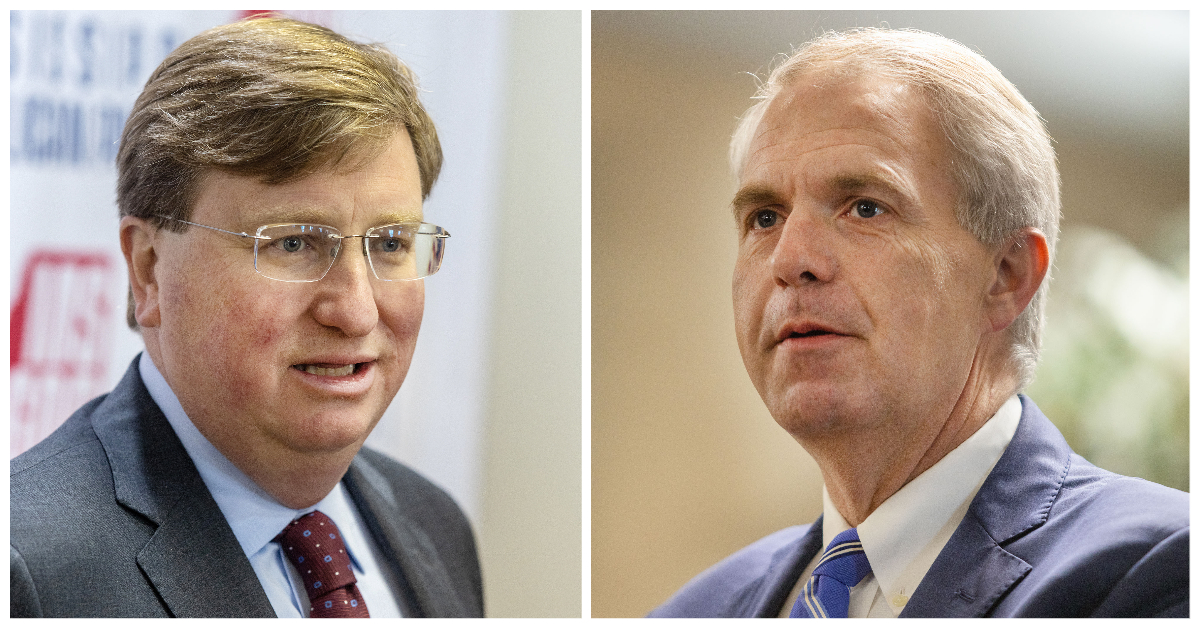Mississippi Today
Tate Reeves, Brandon Presley pitch different tax cuts to voters. Who, exactly, would benefit?

Mississippi's two leading candidates for governor want to chip away at state tax rates, but they have drastically different proposals on which taxes should get axed.
Who, exactly, their respective tax cut proposals would help could emerge as a key deciding issue for the 2023 election for governor.
Republican Gov. Tate Reeves continues to advocate for abolishing the state income tax, and Democratic candidate Brandon Presley wants to eliminate the state's tax on food and cut fees on car tags in half.
Here's a closer look at their dueling proposals.
Reeves' income tax cut proposal
The Legislature in 2017 and 2022 passed significant reductions to the state income tax, which will eventually leave the state with a flat 4% tax rate on all earned income over $10,000 once the cuts are fully implemented.
But Reeves, the first-term governor running for reelection, believes the tax should be ended entirely.
“I pushed to eliminate our state income tax, and we've achieved the largest tax cut in state history,” Reeves said in Gulfport earlier this month. “And we can do more because this is Mississippi's time.”
The governor and House Speaker Philip Gunn, R-Clinton, during the 2023 legislative session this year, urged lawmakers to go even further and eliminate the income tax. But a group of Republican House members bucked party leadership and wouldn't support the measure.
The state's income tax accounts for over $2.4 billion in the general fund, roughly one-third of its total general budget, and it primarily impacts high-income earners because people who earn more money pay more of the tax.
Proponents of the income tax cut argue that reducing the income tax would encourage employers to hire more workers and invest in the economy. Opponents believe the income tax is an equitable way to pay for essential government services and that because eliminating it would also eliminate the state's largest revenue stream, those essential government services would not be met.
Elliott Husbands, Reeves' campaign manager, said in a statement that the governor is primarily focused on eliminating the income tax, but he would consider other tax cuts options that reached his desk.
“It's pretty well known that the governor is as strong a fiscal conservative as you will find, and he will likely sign any cut, on just about any tax, that the legislature sends him, so long as they do not raise any other taxes in the process,” Husbands said.
Presley's grocery tax cut and car tag proposals
Democrats, including Presley, and even some Republican officials for years have called on legislative leaders to ax the state's 7% tax on food, commonly called the grocery tax, the highest such tax in the nation.
The core argument that proponents often make for ending the grocery tax is that it's a cruel policy to force people on all ends of the economic ladder to pay extra money for a basic necessity like food.
“Look, everybody's got to eat,” Presley told Mississippi Today about the grocery tax earlier this month.
Separate legislative chambers in 2022 passed plans to reduce car fees and cut the grocery tax, but never as standalone proposals. That year, the final negotiated tax cut package left the grocery tax intact and didn't change the price of car tags.
Presley's idea to eliminate the grocery tax would impact low-income families the most because they already spend a higher percentage of their income on groceries.
It's unclear how much money Mississippi collects from the grocery tax because the Mississippi Department of Revenue, the state's tax collection agency, doesn't precisely track that data.
Lexus Burns, a spokesperson for the department, said there were over $6 billion in grocery sales during the past fiscal year, which they estimated to have generated around $424.8 million in taxes. Of that amount, over $305 million went to the state's general fund.
When asked if he would support other tax cuts like reductions to the income tax, Presley campaign spokesperson Michael Beyer said that the Democratic candidate is mainly focused on cutting taxes that “help the most Mississippians.”
“As governor, Brandon will fight to cut the car tag fee in half and ax the food tax to give working families more breathing room when they are buying groceries, putting gas in the car, and paying rent,” Beyer said.
More Mississippians support grocery tax cut than income tax cut
A Mississippi Today/Siena College poll shows that eliminating the grocery tax may be a more popular proposal with voters than eliminating the income tax. However, both policies attract some level of support.
The April 16-20 poll found that 58% of a representative group of the state's registered voters would only vote for a candidate who wished to eliminate the grocery tax, and 7% said they would only vote for a candidate who opposed cutting the tax.
That same poll showed 45% of voters will only vote for a candidate who supports abolishing the income tax, and 17% of voters will vote for a candidate who opposed eliminating the tax.
READ MORE: Poll: Grocery tax cut more popular than income tax cut
This article first appeared on Mississippi Today and is republished here under a Creative Commons license.
Did you miss our previous article…
https://www.biloxinewsevents.com/?p=243632
Mississippi Today
On this day in 1917
May 5, 1917

Eugene Jacques Bullard became the first Black American combat pilot.
After the near lynching of his father and hearing that Great Britain lacked such racism, the 12-year-old Georgia native stowed away on a ship headed for Scotland. From there, he moved to Liverpool, England, where he handled odd jobs before becoming a boxer, traveling across Europe before he settled in Paris.
“It seems to me that the French democracy influenced the minds of both White and Black Americans there and helped us all to act like brothers as near as possible,” he said. “It convinced me, too, that God really did create all men equal, and it was easy to live that way.”
When World War I began, he was too young to fight for his adopted country, so he and other American expatriates joined the French Foreign Legion. Through a series of battles, he was wounded, and doctors believed he would never walk again.
No longer able to serve in the infantry, an American friend bet him $2,000 that he could not get into aviation. Taking on the challenge, he earned his “wings” and began fighting for the French Aéronautique Militaire.
He addressed racism with words on his plane, “All Blood Runs Red,” and he nicknamed himself, “The Black Swallow of Death.”
On his flights, he reportedly took along a Rhesus monkey named “Jimmy.” He tried to join the U.S. Air Service, only to be turned away because he was Black. He became one of France's most decorated war heroes, earning the French Legion of Honor.
After the war he bought a Paris nightclub, where Josephine Baker and Louis Armstrong performed and eventually helped French officials ferret out Nazi sympathizers. After World War II ended, he moved to Harlem, but his widespread fame never followed him back to the U.S.
In 1960, when French President Charles de Gaulle visited, he told government officials that he wanted to see his old friend, Bullard. No one in the government knew where Bullard was, and the FBI finally found him in an unexpected place — working as an elevator operator at the Rockefeller Center in New York City.
After de Gaulle's visit, he appeared on “The Today Show,” which was shot in the same building where he worked.
Upon his death from cancer in 1961, he was buried with honors in the French War Veterans' section of the Flushing Cemetery in Queens, New York.
A sculpture of Bullard can be viewed in the Smithsonian National Space and Air Museum in Washington, D.C., a statue of him can be found outside the Museum of Aviation, and an exhibit on him can be seen inside the National Museum of the U.S. Air Force, which posthumously gave him the rank of a second lieutenant. He is loosely portrayed in the 2006 film, “Flyboys.”
This article first appeared on Mississippi Today and is republished here under a Creative Commons license.
Mississippi Today
A seat at table for Democrats might have gotten Medicaid expansion across the finish line
The Mississippi Capitol is 171,000 square feet, granted a massive structure, but when it comes to communication between the two legislative chambers that occupy the building, it might as well be as big as the cosmos.
Such was the case in recent days during the intense and often combustible process that eventually led to the death of Medicaid expansion and with that the loss of the opportunity to provide health care for 200,000 working poor Mississippians with the federal government paying the bulk of the cost.
Democrats in the state House came under intense pressure and criticism for blocking a Medicaid expansion compromise reached by Republican House and Senate negotiators.
First of all, it would be disingenuous to argue that Democrats, who compose less than one-third of the membership of either chamber, blocked any proposal. Truth be known, Republicans should be able to pass anything they want without a solitary Democratic vote.
But on this particular issue, the Republican legislative leadership who finally decided that Medicaid expansion would be good for the state needed the votes of the minority party, which incidentally had been working for 10 years to pass Medicaid expansion. The reason their votes were needed is that many Republicans, despite the wishes of their leaders, still oppose Medicaid expansion.
The breakdown in the process could be attributed to the decision of the two presiding officers, House Speaker Jason White and Lt. Gov. Delbert Hosemann in the Senate, not to appoint a single Democrat to the all-important conference committee.
Conference committees are formed of three senators and three House members who work out the differences between the two chambers on a bill. Considering that Democratic votes were needed in both chambers to pass Medicaid expansion, and considering Democrats had been working on the issue for a decade while Republicans blocked it, it would have made sense that they had a seat at the table in the final negotiations process.
One Democrat from each chamber on the conference committee could not have altered the outcome of the negotiations. But the two Democrats could have provided input on what their fellow legislative Democrats would accept and vote for.
In the eyes of the Democrats, the compromise reached without their voice being heard was unworkable and would not have resulted in Medicaid expansion.
The Republican compromise said Medicaid would not be expanded until the federal government provided a waiver mandating those on Medicaid expansion were working. Similar work requirement requests by other states have been denied. Under the compromise, if the work requirement was rejected by federal officials, Medicaid expansion would not occur in Mississippi.
After voicing strong objections to the work requirement, House Minority Leader Rep. Robert Johnson, recognizing the Senate would not budge from the work requirement, offered a compromise. The Johnson compromise to the compromise was to remove a provision mandating the state apply annually with federal officials for the work requirement.
Instead, under Johnson's proposal, state Medicaid officials would be mandated to apply just once for the work requirement. If it was rejected, Medicaid expansion would not occur, but hopefully that would compel the Legislature to take up the issue of the work requirement and perhaps remove it.
“We just want the Legislature to come back and have a conversation next year if the federal government doesn't approve the work requirement. It's as simple as that,” Johnson said.
Senate leaders agreed that Johnson's proposal was a simple ask and something they might consider.
But Lt. Gov. Delbert Hosemann, who presides over the Senate, said he never heard Johnson's proposal until late in the process — too late in the process, as it turned out.
Speaker Jason White, R-West, also said he never heard the proposal, though Johnson said he repeatedly discussed it with House leaders. He certainly was relaying the information to the media during the final hectic days before Medicaid expansion died.
And perhaps if Johnson or one of his Democratic colleagues had been on the conference committee, that information would have been heard by the right legislative people and perhaps Medicaid expansion would not have died.
After all, a conference room or an office where negotiators are meeting to hammer out a compromise is much smaller than the massive state Capitol, where communications often get lost in the cosmos.
This article first appeared on Mississippi Today and is republished here under a Creative Commons license.
Mississippi Today
On this day in 1884


May 4, 1884

Crusading journalist Ida B. Wells, an African-American native of Holly Springs, Mississippi, was riding a train from Memphis to Woodstock, Tennessee, where she worked as a teacher, when a white railroad conductor ordered her to move to another car. She refused.
When the conductor grabbed her by the arm, “I fastened my teeth in the back of his hand,” she wrote.
The conductor got help from others, who dragged her off the train.
In response, she sued the railroad, saying the company forced Black Americans to ride in “separate but unequal” coaches. A local judge agreed, awarding her $500 in damages.
But the Tennessee Supreme Court reversed that ruling three years later. The decision upended her belief in the court system.
“I have firmly believed all along that the law was on our side and would, when we appealed it, give us justice,” she said. “I feel shorn of that belief and utterly discouraged, and just now, if it were possible, would gather my race in my arms and fly away with them.”
Wells knew about caring for others. At age 16, she raised her younger siblings after her parents and a brother died in a yellow fever epidemic. She became a teacher to support her family.
This article first appeared on Mississippi Today and is republished here under a Creative Commons license.
Did you miss our previous article…
https://www.biloxinewsevents.com/?p=355325
-
SuperTalk FM3 days ago
Driver’s education set to become mandatory in Mississippi as bill passes
-
SuperTalk FM6 days ago
Festival merger in Leland sets up one major event for Mississippi Delta
-
SuperTalk FM2 days ago
State approves $160M to expand Highway 7 to four lanes in Lafayette County
-
Mississippi Business4 days ago
Geartek expanding operations in Alcorn County
-
SuperTalk FM6 days ago
PERS bill set to phase in employer rate increase heads to governor’s desk
-
Mississippi News5 days ago
Two women accused of shoplifting across southeast captured in Mississippi
-
Mississippi News3 days ago
Altercation at Mississippi police department leads to officer-involved shooting
-
Mississippi Today6 days ago
Podcast: The contentious final days of the 2024 legislative session


















![HIGH SCHOOL BASEBALL: Vancleave @ East Central (5/4/2024) [5A Playoffs, Second Round]](https://www.biloxinewsevents.com/wp-content/uploads/2024/05/1714933788_maxresdefault-80x80.jpg)
![HIGH SCHOOL BASEBALL: George County vs. West Jones (MHSAA Playoffs) [05/03/24]](https://www.biloxinewsevents.com/wp-content/uploads/2024/05/1714928237_maxresdefault-80x80.jpg)










![HIGH SCHOOL SOFTBALL: West Harrison vs. George County (MHSAA Playoffs) [05/03/24]](https://www.biloxinewsevents.com/wp-content/uploads/2024/05/1714941224_maxresdefault-80x80.jpg)
![HIGH SCHOOL BASEBALL: East Central @ Vancleave (5/3/2024) [5A Playoffs, Second Round]](https://www.biloxinewsevents.com/wp-content/uploads/2024/05/1714935642_maxresdefault-80x80.jpg)
![HIGH SCHOOL SOFTBALL: Petal @ Ocean Springs (5/3/2024) [7A Playoffs, Second Round]](https://www.biloxinewsevents.com/wp-content/uploads/2024/05/1714939362_maxresdefault-80x80.jpg)








